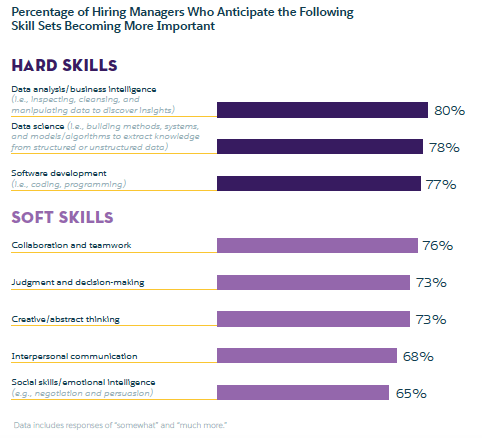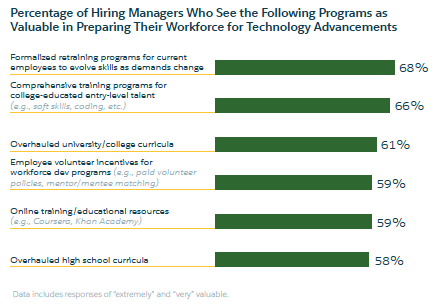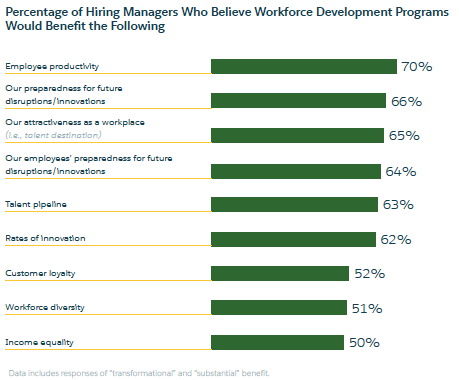
Get your FREE 30-day trial.
Please complete all fields.
Every day, I’m reminded of how fortunate I am to meet and be inspired by incredible individuals who have transformed their careers — and their entire lives — by learning new skills and taking advantage of new technology. And as I watch the number of Trailhead learners increase on a daily basis, I have a continued appreciation for the value of new platforms for learning, and the impact they can have.
But workforce development is a much bigger task than one company — or one career path — can solve. The Fourth Industrial Revolution brings a wealth of exciting opportunities for businesses and workers alike. But if we’re not mindful, we risk leaving behind many of our friends and coworkers without the skills and tools they need to thrive in this new era, not to mention a talent pool that doesn’t meet the needs of modern businesses. I wondered: how do companies across industries view this quandary, and what are they doing to prepare themselves and their employees?
A new Salesforce Research Report, “The Future of Workforce Development,” provides data-fueled answers to precisely these questions. Through a survey of 750 hiring managers across industries and departments, the report finds a disconnect; there's a recognized need for workforce development programs but a lack of urgency to act. This signals alarm bells, but also opportunity for companies that act. Here are a few highlights.
As technology advances, in-demand skills are being redefined
Shifting demand for various skill sets is not a new concept. But hiring managers are bracing for nothing short of a workforce transformation over the next several years. Case in point: The proliferation of the internet of things (IoT) will require savvy abstract thinking of new ways to engage customers, as well as the engineering talent to make it a reality. The exponential growth of artificial intelligence (AI), in particular, means we’re poised to see unprecedented changes on this front. In fact, 62% of hiring managers we surveyed believe that AI will change how we work within five years, and 59% say AI will impact the skills their companies need.
But while technical skills are forecasted to see skyrocketing demand — 77% of hiring managers, for example, expect software development skills to become more important — sophisticated soft skills will also be valued more. Seventy-six percent of hiring managers say collaboration and teamwork skills will become more important, and 73% say the same for creative and abstract thinking. In other words, anyone — regardless of their interests and aptitudes — has an opportunity to thrive in an evolving technology landscape.

Workforce development needs a new approach
There is an urgency for business leaders to understand the role of new technologies and cultivate the skill sets needed within organizations. This will require companies to look beyond traditional education platforms, and investigate new approaches to retraining and re-skilling the existing workforce. It’s not just what businesses teach their workforce, it’s how they teach it. Ideally we should all always be learning, on and off the job, bringing me to my tried and trusted mantra: “Never stop learning.”
Roughly two-thirds of the hiring managers we spoke to believe formal, comprehensive training programs for both new and current employees are valuable to preparing them for technology advancements. As learning increasingly goes digital, 59% see value in online training and educational resources.
Hiring managers also see opportunities in this new age of learning foster a more equal and accessible workforce. Fifty-four percent of hiring managers value both engaging with individuals from nontraditional backgrounds and partnering with independent workforce development organizations like Year Up.

Businesses have an opportunity — and an imperative — to step up
Beyond doing the right thing for their workers, companies have another reason to lean into workforce development initiatives: their own competitiveness. As demand for skills in the intelligent era heats up, so too will a war for talent. Fifty-five percent of hiring managers, for example, believe AI will increase their competition with other firms for skilled employees. It stands to reason, then, that 65% of hiring managers believe that workforce development programs will improve their companies’ preparedness for future disruptions, and 63% believe they will improve their talent pipelines.
Yet, for all their recognition of the need for revamped workforce development programs, companies haven’t made significant progress in making them a reality. Only 18% of companies have formalized employee retraining programs, for example.
Companies win in the Fourth Industrial Revolution when they empower and invest in their workforces. So this begs the question: what’s stopping us?

To get the full picture on the future of workforce development, download the full report.